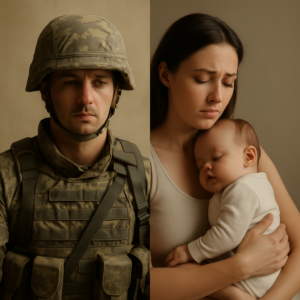New Mom Stress vs Soldier Stress: The Science You Need to Know
Becoming a mother is often described as the most beautiful phase of life. The joy of holding your little one for the first time is beyond words. But behind that joy lies a hidden truth that society rarely acknowledges: new mothers experience stress levels that can be twice as high as those of soldiers in combat.
Sounds shocking? Let’s dive into the science, the emotional reality, and the practical steps families can take to truly support new moms
🌿 Understanding Stress: What Does Science Say?
Stress is the body’s natural reaction to demand or challenge. When we encounter stress, the brain releases cortisol (the stress hormone), which prepares the body to respond.
-
Short term: Stress helps us focus and react quickly.
-
Long term: Chronic stress damages health, mood, and relationships.
According to the American Psychological Association, prolonged stress affects both the brain and body, leading to anxiety, depression, heart problems, and weakened immunity.
Now imagine living in a state of constant stress — that’s the reality for many new mothers.
⚔️ How Motherhood Stress Compares to Combat Stress

A 2011 study in Neuroscience & Biobehavioral Reviews found that postpartum mothers showed cortisol levels and sleep deprivation patterns similar to soldiers in active duty — sometimes worse.
-
Soldiers face high stress in bursts.
-
New moms experience continuous, unrelenting stress for months.
📊 Sleep comparison:
-
Soldiers lose ~300 hours of sleep in 12 months.
-
New moms lose 700+ hours in the first year.
This means a mother’s nervous system is in hyper-alert “survival mode” every day — like being on night watch with no break.
🌸 Why Do New Moms Experience Such High Stress?

1. Sleep Deprivation
Babies wake multiple times at night. Moms sleep in fragmented 90-min cycles, never entering restorative sleep. Effects: irritability, poor memory, higher depression risk.
2. Hormonal Changes
After delivery, estrogen and progesterone levels drop sharply, while cortisol remains high. This storm creates anxiety, mood swings, and fatigue.
3. Constant Hyper-Alertness
A mother’s brain is wired for “maternal vigilance.” She wakes at the slightest baby movement or sound — like soldiers on watch.
4. Emotional & Social Pressures
-
Pressure to be a “perfect mom”
-
Guilt if breastfeeding isn’t smooth
-
Pressure to “bounce back” physically
-
Lack of family help
This invisible load fuels unrelenting stress.
💔 Emotional Impact of Stress on New Moms
Chronic stress affects a new mom’s mental health profoundly:
-
Postpartum depression (PPD): 1 in 7 new moms experience PPD.
-
Anxiety & panic attacks: Cortisol imbalance leads to overwhelming worry.
-
Identity crisis: Many feel they’ve “lost themselves.”
Some mothers even feel like they’re “failing” — when in reality, they’re carrying a stress load heavier than combat soldiers.
🩺 How This Stress Affects Physical Health

Stress doesn’t just live in the mind — it shows in the body:
-
Weak immunity → frequent infections
-
Slower healing after delivery
-
Hair fall & skin issues
-
Digestive problems (acidity, IBS)
-
Long-term heart health risks
Supporting moms’ stress is a health necessity, not a luxury.
🤐 The Silent Burden: Why Many Moms Don’t Speak Up
Moms often hide their struggles because of:
-
Fear of being judged “weak”
-
Pressure to appear grateful and happy
-
Lack of awareness about postpartum stress
-
Cultural silence around women’s struggles
This silence deepens isolation and worsens stress.
👨👩👦 What Families Can Do to Help (Science-Backed Practices)
Research in Journal of Perinatal Education shows moms with strong family support recover faster and show fewer signs of depression.
✨ Families can:
-
Share responsibilities (take turns at night).
-
Provide nutritious meals (balance cortisol).
-
Offer emotional listening (lowers stress markers).
-
Encourage naps (20 mins can reset her brain).
-
Affirm her efforts (acknowledge her strength).
🌸 Self-Care Practices for New Moms
While family support is key, moms can try:
-
Breathing exercises (slows cortisol).
-
Short naps for alertness.
-
Gentle yoga/stretching.
-
Magnesium-rich foods (greens, dark chocolate).
-
Connecting with other moms for emotional support.
💬 Breaking the Stigma: Why Talking About Mom Stress Matters
By comparing mom stress with soldier stress, we highlight: motherhood is one of the most demanding jobs on earth.
Open conversations help:
-
Reduce stigma around postpartum depression.
-
Empower families to step up.
-
Normalize asking for help.
-
Prevent long-term health issues for mom and child.
🌟 Conclusion: A Message of Hope
To every new mom: 💛 You are not weak. You are carrying a stress load heavier than soldiers in combat. Yet every day you rise, feed, comfort, and love your child. That makes you extraordinary.
To every family: 🌸 Your love, patience, and support are more powerful than any medicine. Step in, lighten her load, and remind her she’s never alone.
Motherhood is not meant to be survived in silence — it is meant to be shared in love.

Leave a Reply